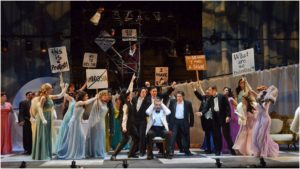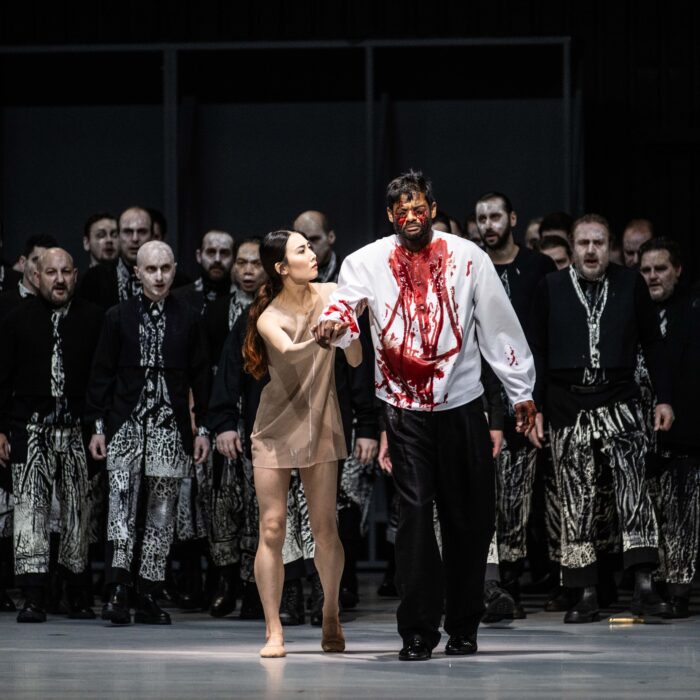
New Orleans Opera 2017-18 Review – Orpheus in the Underworld: Laughs Aplenty in Offenbach’s Satire That Spares Nobody
By Santosh VenkataramanIt’s always a welcome sight when companies stage works that are underappreciated and lesser known. It’s also risky because such unfamiliarity can result in smaller audiences who would be more willing to come out for works that are more recognizable.
With that in mind, it was admirable for New Orleans Opera to present Jacques Offenbach’s “Orpheus in the Underworld” last weekend. Offenbach’s opera bouffe was considered a scandal to the Parisian elite for reasons too numerous to list: its mocking of Gluck’s classic “Orphée et Eurydice,” its storyline of an unhappy marriage and its particularly irreverent treatment of mythical Greek gods. The cleverness of “Orpheus in the Underworld” cannot be doubted and that’s why it entails so many elements to make it work because comedy is generally harder to pull off than drama. Adding to the challenge in New Orleans was that it was performed in English translation.
Putting all of that together in splendid fashion was director Alison Moritz and if any of the gags fell flat, it certainly wasn’t her fault. Moritz, honored two years ago by OPERA America for her innovative design for Marc Blitzstein’s “The Cradle Will Rock,” described her Thebes as a “Levittown-inspired domestic doldrums” while transforming the underworld into a “glamorous nightclub” that only heightened the laughs.
Poking Fun at Gluck
Gluck’s “Orphée” features some of the most beautiful music in opera and there is no better retelling of the myth of how Orpheus resolves to reunite with his deceased wife by going to the underworld to retrieve her. His refrain of “J’ai perdu mon Eurydice” tugs at the heartstrings as one of the greatest declarations of love in music.
Offenbach, simply put, had other ideas for this story. In a prelude to the kind of humor the opera world would see in his “Tales of Hoffmann,” he decided it was best to have the couple Orpheus and Eurydice long for divorce! And while both parties were agreeable to the idea, his creation of the character of Public Opinion was there to put a stop to such proceedings. And when the couple does separate, it makes for even more of a farce as to why and how Orpheus resolves to bring his Eurydice back.
Laughter from the Get-Go
The opening scene is one of the performance’s major highlights. Even before the curtain is raised, we are told of Jupiter’s love of the minuet – a foreshadowing that proves very important in untangling the events at the end. The kitchen of a suburban-raised house is seen and the interplay between tenor Casey Candebat’s Orpheus and soprano Sara Hershkowitz is hilarious. Candebat excels as a violin teacher who absolutely butchers Gluck’s sublime strains while the unhappy Hershkowitz brings plenty of sass to her putdowns of her husband, unlovingly referred to as “Orphy.”
She is carrying on an affair with a shepherd played by tenor Daniel T. Curran while Orpheus has a mistress as well. When the shepherd boy Aristaeus transforms himself into the god Pluto in order to abduct Eurydice and bring her to Hades, she leaves behind a note to her husband saying she is dead and adding that there is no dinner. Of course, when Orpheus reads the note he is more concerned about his next meal than his deceased wife until discovering there are leftovers in the fridge.
Fun Finale
The second scene on Mount Olympus in which the gods were asleep and bored may have had the same effect on the audience, with too much dialogue and the plot point of Jupiter’s familial issues perhaps lost a bit in the translation. After the intermission, the performance came back to life in hell, where a poster with the words “Wait Here” was part of the setting.
Hershkowitz is transformed from a frumpy housewife to a sexy, lingerie-clad ball of fire as Eurydice. It is here that Juan Luis Williams excels as John Styx with his comic tale of woe of being the King of Beotia. That set the stage for baritone Jarrett Ott’s Jupiter and Hershkowitz to shine in Eurydice’s “fly duet” with Hershkowitz’s buzzing as the fly keeping the audience in stitches.
The finale with the famed “can-can” or “Infernal Galop” brought to mind a performance by the Rockettes in Radio City Music Hall, and Orpheus’ bumbling response to lightning as the trigger to look back at Eurydice was executed flawlessly by all parties. Appropriately, all hell broke loose at the end.
Conductor Robert Lyall worked his way through the madness well with his Louisiana Philharmonic Orchestra. Soprano Jeanne-Michele Charbonnet played an amusing Public Opinion while soprano Angela Mannino was hilarious in her Cupid. They were part of a delightful ensemble cast required for this work, and credit to New Orleans Opera for a commendable performance.


